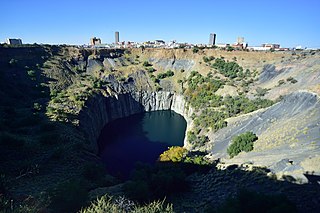
Kimberley is the capital and largest city of the Northern Cape province of South Africa. It is located approximately 110 km east of the confluence of the Vaal and Orange Rivers. The city has considerable historical significance due to its diamond mining past and the siege during the Second Anglo-Boer war. British businessmen Cecil Rhodes and Barney Barnato made their fortunes in Kimberley, and Rhodes established the De Beers diamond company in the early days of the mining town.
Beaconsfield is a town in Buckinghamshire, England.

After campaigning against the foreign policy of the Beaconsfield ministry, William Gladstone led the Liberal Party to victory in the 1880 general election. The nominal leader of the Party, Lord Hartington, resigned in Gladstone's favour and Gladstone was appointed Prime Minister of the United Kingdom for a second time by Queen Victoria. He pursued a policy of parliamentary reform, but his government became wildly unpopular after the death of General Gordon in 1885. Gladstone was held responsible, and resigned, leaving the way free for the Conservatives under Lord Salisbury to form a government.

Cape Town railway station is the main railway station of the city of Cape Town, South Africa. It is located along Adderley and Strand Streets in the city's central business district.

The siege of Kimberley took place during the Second Boer War at Kimberley, Cape Colony, when Boer forces from the Orange Free State and the Transvaal besieged the diamond mining town. The Boers moved quickly to try to capture the area when war broke out between the British and the two Boer republics in October 1899. The town was ill-prepared, but the defenders organised an energetic and effective improvised defence that was able to prevent it from being taken.
Andrew Henry Martin Scholtz was a South African writer.
William Thomas Gaul (1850–1927) was Rector of All Saints Church, Du Toit's Pan, Kimberley, afterwards of St Cyprian's Church, Kimberley, Rural Dean of Griqualand West, and Archdeacon in what was still the Diocese of Bloemfontein, before being elected the second Bishop of Mashonaland, where he styled himself "the smallest bishop with the largest diocese in Christendom." He officiated at the funeral of Cecil John Rhodes and helped draft the Rhodes Trust Deed.
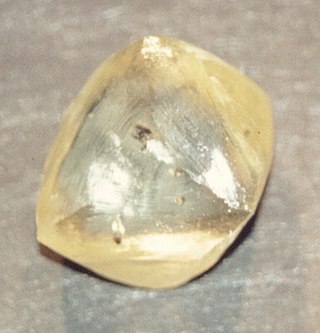
Du Toit's Pan, now usually Dutoitspan, is one of the earliest diamond mining camps at what is now Kimberley, South Africa. It was renamed Beaconsfield, which existed as a separate borough from Kimberley itself until Kimberley and Beaconsfield were amalgamated as the City of Kimberley in 1912.
Frances Goitsemang Baard OMSS OLG was a South African trade unionist, organiser for the African National Congress Women's League and a Patron of the United Democratic Front, who was commemorated in the renaming of the Diamantveld District Municipality (Kimberley) as the Frances Baard District Municipality. Schoeman Street in Pretoria was also renamed in her honour. This heroine is the reason we celebrate National Women's Day today in South Africa.

The South African Railways Class 26 4-8-4 of 1981, popularly known as the Red Devil, is a 4-8-4 steam locomotive which was rebuilt from a Class 25NC locomotive by mechanical engineer David Wardale from England while in the employ of the South African Railways. The rebuilding took place at the Salt River Works in Cape Town and was based on the principles developed by Argentinian mechanical engineer L.D. Porta.
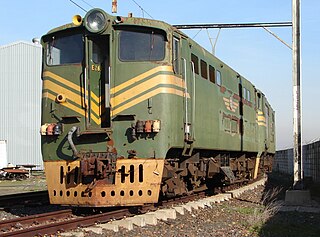
The South African Railways Class 5E, Series 3 of 1958 was an electric locomotive.
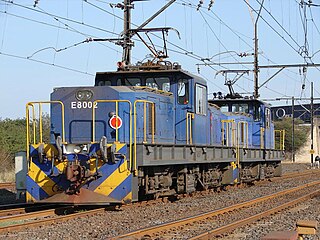
The South African Railways Class 8E of 1983 is an electric locomotive.
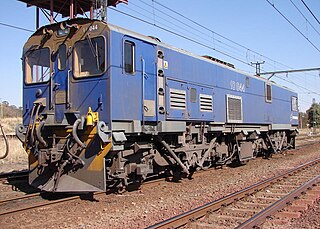
The South African Railways Class 10E of 1985 is an electric locomotive.

The South African Railways Class 10E2 of 1989 is an electric locomotive.

The South African Railways Class 23 4-8-2 was a class of South African steam locomotives.

The South African Railways Class 16E 4-6-2 of 1935 is a class of passenger steam locomotive.
William Henry McCluskey was an Irish soldier and survivor of HMS Birkenhead after it was wrecked in 1852.

Sol Plaatje University is a public university located in Kimberley, South Africa. Established in 2014, it is the first and only university located in the Northern Cape province.
William Benbow Humphreys (1889-1965), City Councillor in Kimberley, Member of the Cape Provincial Council, and Member of Parliament, was the founder of the William Humphreys Art Gallery in Kimberley. He became, in 1961, the second recipient of the Freedom of the City of Kimberley. Humphreys was born in Oudtshoorn on 5 April 1889 and died in Kimberley on 25 July 1965.
The South African and International Exhibition was a world's fair held in Kimberley, Cape Colony in 1892 to promote trade and labour.















